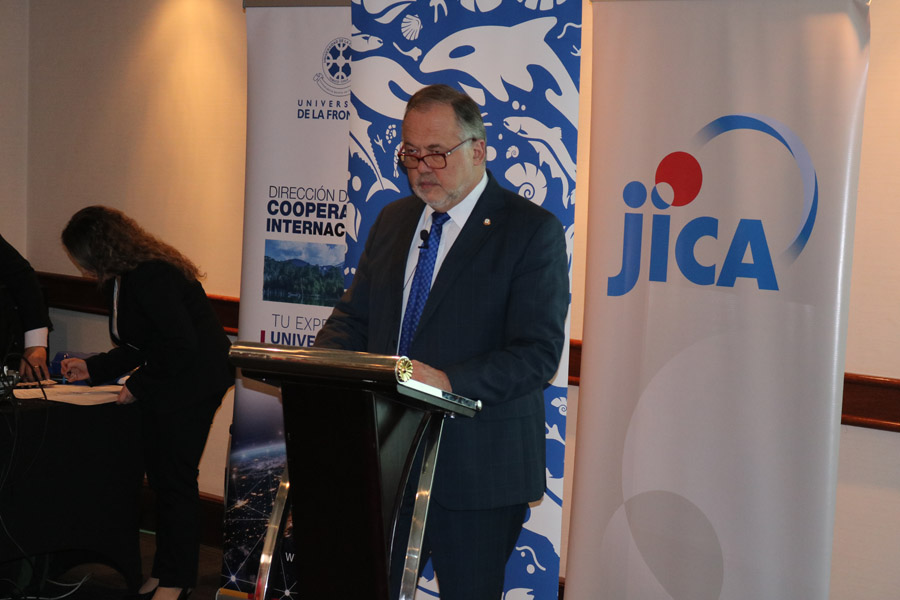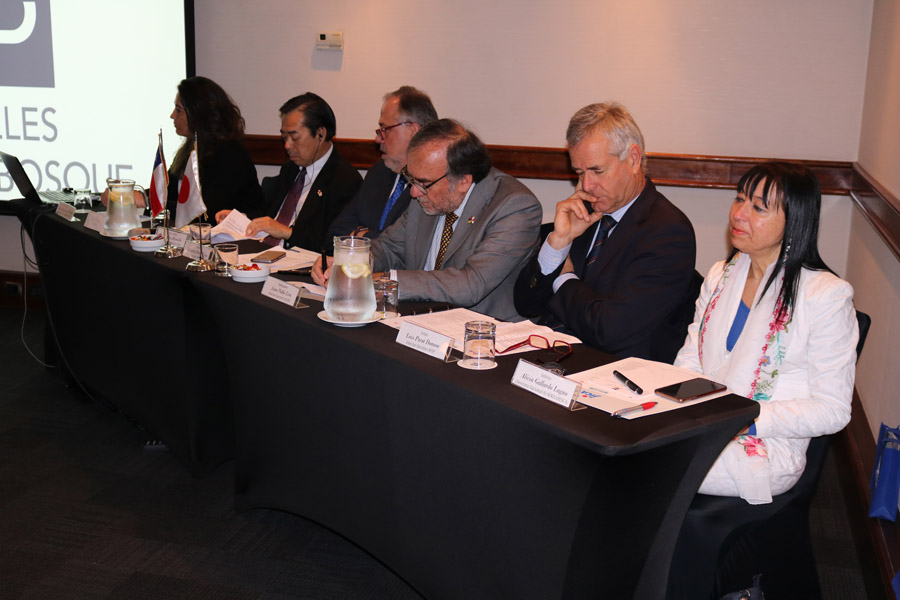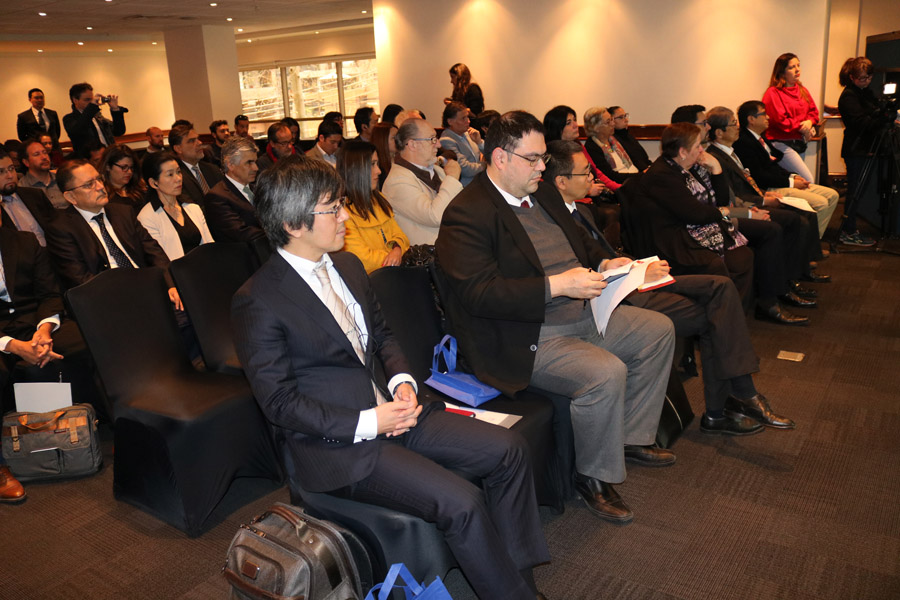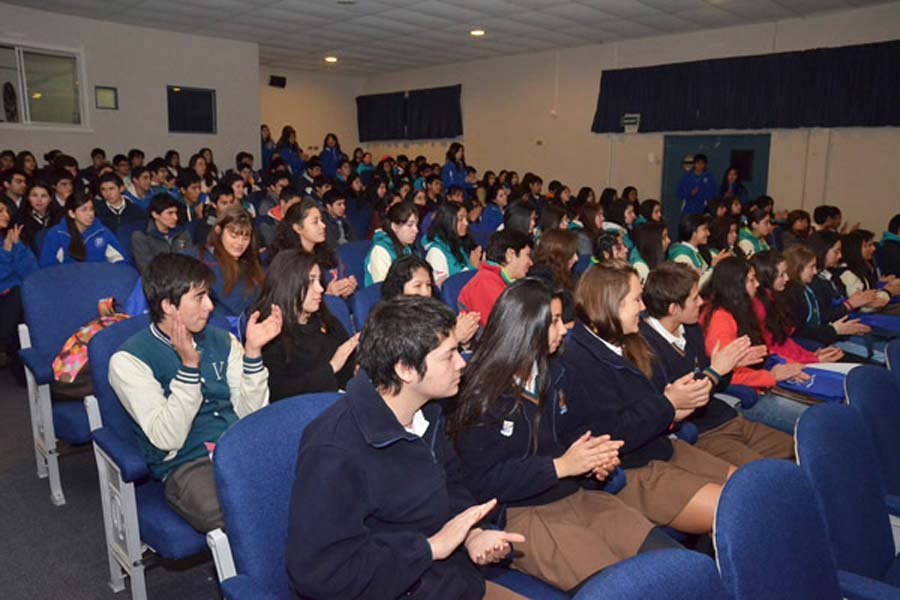|
It is excellent news for the Faculty of Dentistry which just joined the Association for Dental Education in Europe (ADEE). In this context, the unit also recently participated in the Annual Meeting of the Association in Oslo, Norway, from August 22nd to 24th. |
For the Faculty of Dentistry of the Universidad de La Frontera it is important to be part of this organization that brings European and non-European university faculties of dentistry, as well as specialized societies and other institutions related to dental education, together.
 Written by: Soledad Millapán Written by: Soledad MillapánFaculty of Dentistry |
|
Different authorities of the public sector and public and state institutions of both countries participated at the launch of the initiative which could benefit large part of the coastal sector in the south of Chile with its results. |
The Universidad de La Frontera is going to lead this unique research project, which will bring academics, institutions and companies of the private sector in Chile and Japan together, during the next five years. It is an initiative for the development of a red tide early alert system that allows to monitor, predict and detect the blooming of red tide in the south of Chile. The project is financed by the Japan Science and Technology Agency (JST) and the Japan International Cooperation Agency (JICA). This ambitious research project will be led by the Universidad de La Frontera in Chile. The institution will be the executing entity and will coordinate the work of the different parties that are involved. “Nowadays, researchers cannot work alone. Associativity and internationalization are the right way forward. The project we are launching has the following particularities: it brings science to the people and the reality of the environment, with a strong social aspect that improves the life quality of the people,” Dr. Eduardo Hebel, the rector of the university, indicated at the official launching ceremony for the project that took place in the Metropolitan Region of Chile. One of the participants in the ceremony was the Japanese Ambassador in Chile, José Hiraishi, who said: “We have been supporting Chile for several years in our country, with the aim of improving the quality of the fishes´ life and of the productive development. As an example, since the 70s, we have been financing different projects across the country that have brought direct benefits for the coastal sectors, what makes us very happy.” Authorities of the Chilean Undersecretariat for Fisheries and Aquaculture (SUBPESCA), the National Fisheries and Aquaculture Service (SERNAPESCA) and the Ministry of Health (MINSAL) participated in the launching ceremony. Also researchers of the Chilean Universities of Antofagasta and Los Lagos are going to work in the development of the project. COORDINATION Dr. Milko Jorquera, an UFRO academic, will lead the project and coordinate the work of the different institutions, and the universities´ and public and private organisms´ research teams. Dr. Fumito Maruyama, an academic of the Kyoto University in Japan, is the one who is going to play an important role in the development of the project, permitting to coordinate and consolidate the work of the different participants and organizations in Japan. “I feel that this project directly benefits the local people, having in mind that it is an initiative of the public, academic and industrial sector. I suppose that, at the end of the project, its results will help the local population, the fishing and artisanal sector, and the entities of the southern coastal sector,” he said. At the end of 2016, the bloom of the red tide caused an estimated loss of 800 million USD in Chile, when the authorities declared the coastal area of the Los Lagos Region a catastrophe zone.
Written by: Sergio Valenzuela
Communications Office |
|
The Municipality of Temuco and the Universidad de La Frontera participated in the third version of Do! Smart City Santiago, the biggest national meeting in Chile that seeks to promote the development of sustainable and smart cities. |
Given the alliance between the Faculty of Engineering and Science of the Universidad de La Frontera and the Municipality of Temuco, who seek to develop a project during the next three years that allows to transform Temuco, the capital of the Araucanía Region, into the first smart city in Chile, representatives of both institutions were present at this important event, with a joint stand. In this space, the participants were able to get to know the different initiatives for technological innovation which the researchers of this university will be working on in order to implement an open Smart City platform and pilots in the field of transportation, recycling and environmental decontamination, among other fields that are considered key for the development of Temuco and its citizens´ quality of life. The UFRO was represented by authorities and academics, such as Franklin Valdebenito Godoy, the director for Innovation and Technology Transfer, and Janina Hanswillemenke and Mauricio Granzotto, professionals of the MacroFaculty of Engineering. The delegation of the Municipality of Temuco was led by the Mayor, Miguel Becker. “It is important to be part of this initiative. We do not only want that Temuco is going to be present, but also a protagonist in the great changes. Our aim is to become a smart city that encourages its citizens to participate and that, with the help of a network of collaboration, puts people first, prioritizing their well-being and connectivity with public services. Therefore, information and communication technologies play a key role,” Franklin Valdebenito stated. Another special appearance at Do! Smart City Santiago 2018 was made by the NAO robot of the UFRO Department of Electrical Engineering who was in charge of welcoming the participants in his particular way. This version of Do! Smart City Santiago included activities such as networking, a fair for products and services especially designed to give real solutions to urban problems, and a congress that, via forums and panels, brought Chilean and foreign experts together, as well as businessmen and representatives of social and civil organizations, in order to analyze and debate the problems the citizens face in their daily lives around town.
Written by: Daphne Bormann
Faculty of Engineering and Science |
|
250 schools from Arica to Punta Arenas will be assessed between August 20th and September 7th and the Institute will be responsible for the application of the seventh version of PISA. |
The Programme for International Student Assessment (PISA) is a triennial international survey which was created by the Organization for Economic Co-operation and Development (OECD) in the year 2000 and aims to evaluate education systems worldwide by testing the skills and knowledge of 15-year-old students in the fields of science, mathematics and reading. This year, about 82 countries are participating and receive an opportunity to compare their students´ performance on a global scale and to improve their own education systems both in comparison to other countries, and in relation to previous results. In Chile, the authority in charge of the Program is the Chilean Education Quality Assurance Agency. “This is a survey that has consequences for education worldwide. This is why it is so important. Chile will apply the tests this year, and in 2019, we will have the results,” explained Dr. Enrique Hinostroza, the director of the UFRO Institute of Educational Computer Science (IIE). At the same time, this is a mayor challenge for the Institute, since it requires high operating and monitoring standards, and in this field the IIE has repeatedly shown its capabilities, which have been put to the test during the Education Quality Measurement System (SIMCE) tests in the south of Chile, the Diagnostic National Assessment for Initial Teacher Training in the whole country and the International Computer and Information Literacy Study (ICILS). “We have been part of a national tender and our previous experience was the crucial point that allowed us to take up this new challenge. During three weeks, children born between May 2002 and April 2003 will be tested in different educational establishments over the country. The first two weeks will be for the regular application of the tests and the third week will be for complementary applications for students who were not able to attend the first time," he adds. APPLICATION Not only students of scientific and humanistic establishments are considered, but also the ones for technical education, since the objective is to measure the capabilities of all 15-year old teenagers. All of them should have the same level of knowledge. “The assessment is applied to a nationally representative sample of students, which allows us to know the status of the Chilean education system as a whole. Unlike SIMCE, in which each student of each establishment gets tested, this test gives a national result. A total of ten thousand students will be assessed, also with participation of the parents, teachers, and principals, who will complete questionnaires that contain multiple sections,” he stated. The PISA tests are computer-based. The software can be uploaded to a removable device that will be connected to the schools´ computers, so the students will be able to answer the set of questions completely digitally. In order to ensure the success of the software, a team of 300 professionals, distributed from north to south, has been put together. They will be responsible for the application of the tests in each establishment. PISA tries to make a more systematic analysis of the factors that influence the educational results. Based on the results, the OECD publishes a series of articles, analyzing the results in order to identify a relation between what students have learned and their study habits, the teachers´ characteristics, educational establishments, etc. Written by: Lorena Espinoza
Vice-rectorate for Research and Graduate Studies |


















